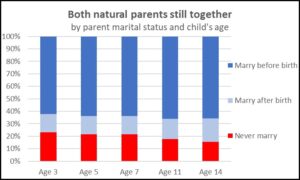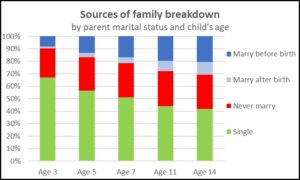Britain has the highest level of family breakdown in recorded history: our research finds that 45% of teens are not living with both natural parents. The Deaton poverty review finds a similar figure of 43%. This is a fivefold increase from 9% in 1974.

The direct consequences of family breakdown include poverty, higher risk of mental health problems and poor exam results, and an annual bill to the taxpayer that exceeds the defence budget
Family breakdown is likely to get worse because of (a) the intergenerational transmission of family breakdown and (b) no sign of an upturn in marriage rates
The driver of family breakdown is not divorce, now at its lowest level since 1970, but the collapse of unmarried families. Married families account for 85% of intact parents yet just 30% of family breakdown


Marriage protects couples against family breakdown because all the psychological ingredients of commitment are automatically built in. For example, the poorest married parents are more stable than even the richest cohabitees
Our politicians embrace marriage in their private lives. Yet they are indifferent or antagonistic to marriage in their public policies. Worst of all, our welfare system actively penalises couples on low income who live together or marry.
Marriage is a social justice issue. Yet nobody is talking about it.
We need to talk about marriage
